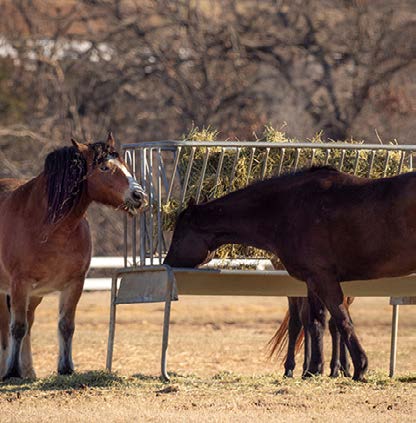
The need for quality horse hay – shorthand for attributes desirable in hay fed to equines – seems to be ever-present.
Attributes of desirable horse hay include:
Clean – It should not contain trash, dirt, dust, toxins, fungus, mold, bugs, weeds or other material that can interfere with digestion.
Uniform – Bales should have the same appearance relative to the types and maturities of the plants in the cases of alfalfa or bermudagrass, or similar amounts of mixes of range grasses in bales of prairie grass.
Proper preparation – The hay should have been harvested or cured correctly, at a moisture content level to not promote mold growth.
Appealing – Horses must be satisfied visually and tactilely, which means stem size should be small to moderate and the plants should have a significant amount of leaves compared to the stem.
Horses typically do a good job of eating and digesting immature to mid-growth plants, but do not digest mature plants as well as other livestock. As such, a major defining point of horse hay is that it is a plant variety and only mature enough to encourage intake. Plants with a high proportion of leaf compared with stem weight will be more digestible, as will varieties of grasses that have inherently smaller stem sizes, such as bermudagrass.
“We recommend not using Johnsongrass hay because of potential toxicity issues,” Hiney said. “Avoiding Johnsongrass is good risk management.”
Given the list of desirable attributes, it is not unusual for horse hay to be more expensive than other types of hay, in part because production requires more inputs such as herbicides and fertilizers. Those costs may be passed on to the buyer. In addition, harvesting plants in an immature state to enhance digestibility generally means the volume of production on a weight basis will be less.
The increased cost may be a better value for the horse manager regardless. Bermudagrass digestible protein content will decrease by as much as 40% from mid-growth to late-growth hay, and about 10% in digestible energy content. On an energy basis, paying 10% more for the mid-growth hay versus late growth typically will be a good buy. Expect the same drop in nutritional value from early bloom to mid-bloom alfalfa.
If comparing alfalfa to bermudagrass, estimate mid-bloom alfalfa to have about 20% more digestible energy per weight than mid-growth bermudagrass, and as much as 50-60% more protein. Prairie grass is similar to bermudagrass. It depends on the variety and maturity of plants in the prairie grass hay.
“In general, you can estimate prairie grass hay to be at least 20% less nutritious because plants had to reach greater maturity to ensure adequate amounts for harvesting,” Hiney said. “Of course, all comparisons assume the hay is clean, uniform, and harvested correctly. As for alfalfa, make sure it is free of blister beetles.”
Fact sheets detailing research-based information about feeding horses and other equine management practices are available online and through OSU Extension county offices.
Hiney also is conducting a series of horse owner workshops, as well as seminars for equestrians with disabilities. Information shared as part of the agricultural television program SUNUP is available online.
